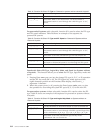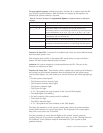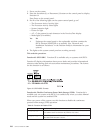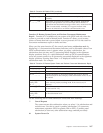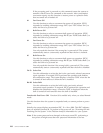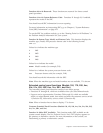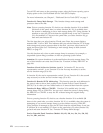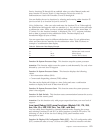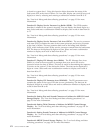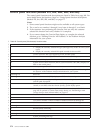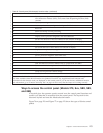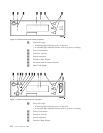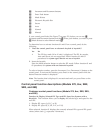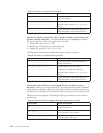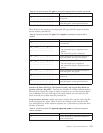is found on system bus 1. Using this function helps determine the status of the
load source IOP at the time of failure. To view data, display one word (4 bytes or 8
digits) at a time by selecting and entering a subfunction number from 00 to 3F.
See “Low-level debug and data collecting procedures” on page 131 for more
information.
Function 55–Display Service Processor Log Buffer (SPLB): The SPLB contains
data that is related to the system’s stopping. You can display the data 8 digits at a
time. Select and enter a subfunction number to display each word of data from 00
to FF.
See “Low-level debug and data collecting procedures” on page 131 for more
information.
Function 56–Display Service Processor Code Area (SPCA): The service processor
code area (SPCA) contains the state of the system processor and service processor
at the time of failure. This area contains data such as the failing load identifier
(LID), which indicates what LID the service processor wanted from the load-source
IOP. The data can be displayed 8 digits at a time. Select and enter a subfunction
number to display each word of data from 00 to FF.
See “Low-level debug and data collecting procedures” on page 131 for more
information.
Function 57–Display IPL Message Area (IMSA): The IPL Message Save Area
(IMSA) is a first-in-first-out queue of messages that were sent to the service
processor before the time of failure. This area is useful in determining the sequence
of events on the system I/O bus before the failure. The data can be displayed 8
digits at a time. Select and enter a subfunction number to display each word of
data from 00 to 3F.
See “Low-level debug and data collecting procedures” on page 131 for more
information.
Function 58–Display IPL Parameter Area (IPARMS): The IPL parameters area
contains the status of the type of IPL that you are performing. The data can be
displayed 8 digits at a time. Select and enter a subfunction number to display each
word of data from 00 to 08.
See “Low-level debug and data collecting procedures” on page 131 for more
information.
Function 59–Setting First and Second Characters of Address for MFIOP Control
Storage Display: See “Low-level debug and data collecting procedures” on
page 131 for more information.
Function 60–Setting Third Character of Address for MFIOP Control Storage
Display: See “Low-level debug and data collecting procedures” on page 131 for
more information.
Function 61–Setting Fourth Character of Address for MFIOP Control Storage
Display: See “Low-level debug and data collecting procedures” on page 131 for
more information.
Function 62–MFIOP Control Storage Display: See “Low-level debug and data
collecting procedures” on page 131 for more information.
172 Service Functions V5R2



